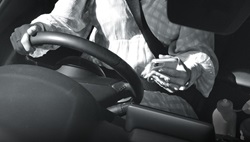Driver distractions

There are a lot of factors that can cause crashes — speeding, drink driving and fatigue to name a few. What many people don’t realise is that distracted drivers can be just as dangerous. You need to focus at all times when you’re behind the wheel.
Distracted drivers are a danger not only to themselves and their passengers but to other road users as well. It only takes a split second to lose your concentration. Some common distractions when driving are:
- talking on your mobile phone
- reading or sending a text on your mobile phone
- changing your radio station or scrolling to a song in your playlist
- attending to children in the backseat.
Having a mobile phone in your hand or resting it on any part of your body while driving is illegal. This applies to all drivers at all times regardless if the phone is on or in use. If you’re caught you may get a fine and demerit points. Learner and P1 drivers under 25 years of age have additional restrictions. They can't use a mobile phone in any way while driving, including hands-free, headsets or loudspeaker – learn more about mobile phone rules.
Here are some tips to help you avoid becoming distracted while you drive:
- Turn off your mobile phone or switch it to 'Do Not Disturb' before you get in your car — that way you won’t be tempted to answer your phone.
- If you can’t avoid having your mobile phone on, install a phone mount or holder — that way you can drive and talk on your phone more safely, but don’t forget to keep concentrating on driving. Learner and P1 drivers under 25 years of age can't use a mobile phone while driving, including hands-free, headsets or loudspeaker. Their passengers are also not allowed to use a phone's loudspeaker.
- If you have children with you in the backseat make sure they are securely restrained and have plenty of things to keep them occupied for the duration of the trip:
- having a selection of toys to play with
- playing games such as “I spy”
- playing their favourite music
- providing a range of healthy snacks and drinks (avoid milk-based products if your child is prone to car sickness).
- Plan regular stops to beat fatigue and let the kids burn some energy (at least a 15 minute break every 2 hours is recommended). If you do need to attend to your children during the trip, pull over and stop the vehicle before sorting out the situation.
- If you’re listening to music from an app on your phone, choose your music playlist before you start your trip. If you’re listening to the radio make sure the stations are tuned in before you set off so you aren’t searching for a station while you’re driving. If you need to change the music, stop your vehicle before you start playing with the buttons.
Find out more about the dangers of driver distractions by visiting StreetSmarts.


